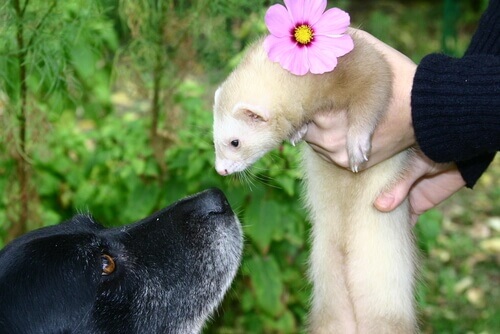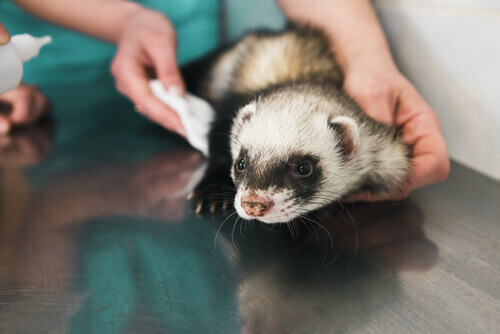Considerations Before Having a Ferret as a Pet


Written and verified by the lawyer Francisco María García
Ferrets: Morphological aspects and behavior
Ferrets are small carnivorous mammals that tend to weight between 1.5 and 4.5 pounds. They’re very active and curious by nature and can live with adults and children as long as they’re well trained.
These small animals reach adulthood by the time they’re a year old and have an average life expectancy of about 8 years. They’re nocturnal and can sleep up to 15 hours a day. However, they require a dark environment in order to get the sleep they need.
What to consider before having a ferret as a pet: Ferret care
Ferrets are wild animals but can be tamed

Truth be told, the only animals that are truly domesticable are cats and dogs. These animals possess unique genes and can maintain the characteristics of their infancy into adulthood. This allows them to not fully develop their instincts and, therefore, be domesticated.
The owner’s experience and time
This is a basic rule when it comes to any pet and any pet owner. Anyone who adopts an animal for the first time should choose a species that’s easy to care for and handle.
Ferrets are hunters by nature. They’re full of energy and need a lot of care when it comes to their hygiene, nutrition, and socialization. Interacting with these animals requires knowledge, time, and patience.
So, if you’re thinking of giving a ferret to a child, then you’ll need to teach him or her about future responsibilities. Always remember that pets aren’t toys… you can use them and then abandon them when the going gets tough.
Environment and habitat
As we’ve mentioned, ferrets have quite a bit of energy. They love to exercise, run freely, and play. Therefore, before having a ferret as a pet, you need to make sure you have enough space. Ideally, you should have an outdoor space with dirt, grass, and trees.

For safety reasons, it’s best to have a large cage for your ferret. Just the same, pet ferrets also need free time outside of their cages in order to preserve their mental and physical health.
Socialization and getting along with others
The socializing process when it comes to ferrets consists of taming their hunting instincts and adapting their responses to different stimuli. This reduces the probability of aggressive behaviors and improves their ability to live with others.
When ferrets don’t get the socialization they need, they can become aggressive. So, if owners don’t have the time and experience needed to train a ferret, then a specialized professional can be a good solution.
Adapting budgets
Another issue to consider before having a ferret as a pet is the cost. Ferrets can end up being fairly expensive to maintain. Therefore, before adopting one, you should take some to crunch numbers and make sure you can make the financial commitment. You may end up realizing that a different type of pet would better suit your budget.

It all begins with the price you pay in order to acquire a ferret from a legalized seller. Then, you have to add on the costs of a specialized veterinarian and providing your pet with the care it requires. With that in mind, you need to include the costs of preparing the right environment, toys, food, and other items your ferret will need.
Microchipping ferrets
Having a ferret in your home
Ferrets are carnivorous animals, but living with humans makes them adopt omnivorous habits. Their diet should contain a proper proportion of protein, fiber, carbohydrates, fat, vitamins, and minerals.
The simplest way to meet your ferret’s nutritional needs is to opt for good commercial ferret food. You shouldn’t give raw food raw meat to ferrets in order to prevent contamination from bacteria and toxins. Nor should you give your pet leftovers from human food.

Preventative medicine and care
The vaccination calendar for ferrets begins during their second month of life and continues annually for the rest of their lives. Vaccines are an important defense against rabies and distemper, as ferrets are vulnerable to both diseases.
Periodical worming of ferrets is fundamental, as is taking preventative measures to repel mosquitos. You should also neuter domestic ferrets in order to keep them from escaping when they’re in heat.
Having a ferret as a pet: Reinforcing hygiene
Ferrets need a lot of attention when it comes to their hygiene. Owners should bathe pet ferrets on a regular basis–two or three times a month. However, during the cold winter months, one bath every two months will suffice.
Also, you should use specific products for ferret hygiene. Human cosmetics and cleaning products can be poisonous to animals and seriously harmful to their health.
Have a ferret as a pet requires time, knowledge, and patience. Before choosing to take one home with you, it’s important to prepare yourself and adapt your lifestyle, home, and budget for your pet’s arrival.
Ferrets: Morphological aspects and behavior
Ferrets are small carnivorous mammals that tend to weight between 1.5 and 4.5 pounds. They’re very active and curious by nature and can live with adults and children as long as they’re well trained.
These small animals reach adulthood by the time they’re a year old and have an average life expectancy of about 8 years. They’re nocturnal and can sleep up to 15 hours a day. However, they require a dark environment in order to get the sleep they need.
What to consider before having a ferret as a pet: Ferret care
Ferrets are wild animals but can be tamed

Truth be told, the only animals that are truly domesticable are cats and dogs. These animals possess unique genes and can maintain the characteristics of their infancy into adulthood. This allows them to not fully develop their instincts and, therefore, be domesticated.
The owner’s experience and time
This is a basic rule when it comes to any pet and any pet owner. Anyone who adopts an animal for the first time should choose a species that’s easy to care for and handle.
Ferrets are hunters by nature. They’re full of energy and need a lot of care when it comes to their hygiene, nutrition, and socialization. Interacting with these animals requires knowledge, time, and patience.
So, if you’re thinking of giving a ferret to a child, then you’ll need to teach him or her about future responsibilities. Always remember that pets aren’t toys… you can use them and then abandon them when the going gets tough.
Environment and habitat
As we’ve mentioned, ferrets have quite a bit of energy. They love to exercise, run freely, and play. Therefore, before having a ferret as a pet, you need to make sure you have enough space. Ideally, you should have an outdoor space with dirt, grass, and trees.

For safety reasons, it’s best to have a large cage for your ferret. Just the same, pet ferrets also need free time outside of their cages in order to preserve their mental and physical health.
Socialization and getting along with others
The socializing process when it comes to ferrets consists of taming their hunting instincts and adapting their responses to different stimuli. This reduces the probability of aggressive behaviors and improves their ability to live with others.
When ferrets don’t get the socialization they need, they can become aggressive. So, if owners don’t have the time and experience needed to train a ferret, then a specialized professional can be a good solution.
Adapting budgets
Another issue to consider before having a ferret as a pet is the cost. Ferrets can end up being fairly expensive to maintain. Therefore, before adopting one, you should take some to crunch numbers and make sure you can make the financial commitment. You may end up realizing that a different type of pet would better suit your budget.

It all begins with the price you pay in order to acquire a ferret from a legalized seller. Then, you have to add on the costs of a specialized veterinarian and providing your pet with the care it requires. With that in mind, you need to include the costs of preparing the right environment, toys, food, and other items your ferret will need.
Microchipping ferrets
Having a ferret in your home
Ferrets are carnivorous animals, but living with humans makes them adopt omnivorous habits. Their diet should contain a proper proportion of protein, fiber, carbohydrates, fat, vitamins, and minerals.
The simplest way to meet your ferret’s nutritional needs is to opt for good commercial ferret food. You shouldn’t give raw food raw meat to ferrets in order to prevent contamination from bacteria and toxins. Nor should you give your pet leftovers from human food.

Preventative medicine and care
The vaccination calendar for ferrets begins during their second month of life and continues annually for the rest of their lives. Vaccines are an important defense against rabies and distemper, as ferrets are vulnerable to both diseases.
Periodical worming of ferrets is fundamental, as is taking preventative measures to repel mosquitos. You should also neuter domestic ferrets in order to keep them from escaping when they’re in heat.
Having a ferret as a pet: Reinforcing hygiene
Ferrets need a lot of attention when it comes to their hygiene. Owners should bathe pet ferrets on a regular basis–two or three times a month. However, during the cold winter months, one bath every two months will suffice.
Also, you should use specific products for ferret hygiene. Human cosmetics and cleaning products can be poisonous to animals and seriously harmful to their health.
Have a ferret as a pet requires time, knowledge, and patience. Before choosing to take one home with you, it’s important to prepare yourself and adapt your lifestyle, home, and budget for your pet’s arrival.
This text is provided for informational purposes only and does not replace consultation with a professional. If in doubt, consult your specialist.








